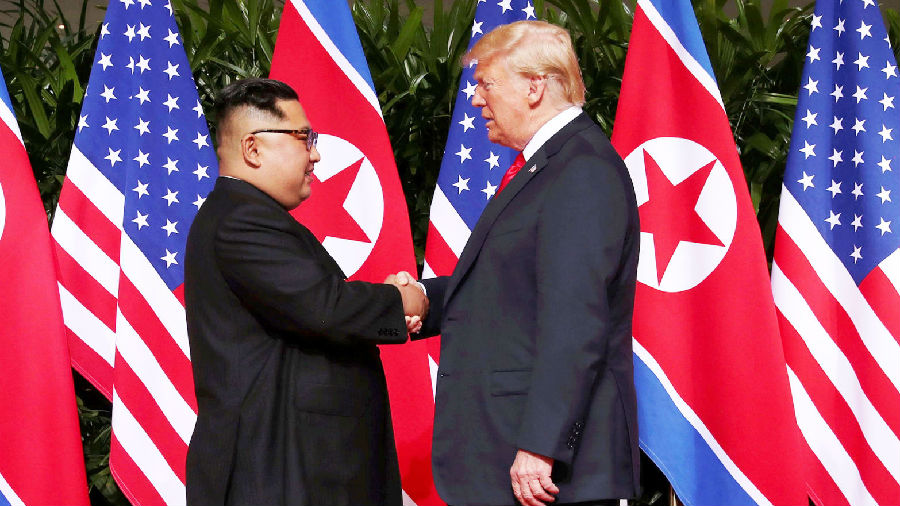Washington points to historic examples of countries willingly and openly standing down their nuclear programs: South Africa after it democratized and Ukraine after the dissolution of the Soviet Union. If you do that, the U.S. has told the North, the money will begin to flow.
美国指出,一些国家愿意并公开地放弃其核项目,这是具有历史意义的例子:南非是在解体后,乌克兰是在苏联解体后。美国告诉朝鲜,如果这样做,资金就会开始流动。
That position ignores the extraordinary level of mistrust between the Kim regime and the U.S., say current and former diplomats who have dealt with Pyongyang. Consider what the North means when it talks about denuclearizing the Korean Peninsula. Yes, it wants the South removed from the U.S. nuclear umbrella—the air and seaborne weapons standing ready to defend Seoul and other East Asian allies—but its sights go much further. U.S. diplomats and intelligence officials have learned to their chagrin that the North Korean government apparently believes—incorrectly—that the U.S. still maintains a secret stash of nuclear weapons in the South. In a December 20 statement, Pyongyang said the U.S. “must study geography.” The Korean Peninsula, it said, “includes the territory of our republic and also the entire region of South Korea where the United States has placed its invasive force, including nuclear weapons.”

和朝鲜政府打过交道的前任和现任外交官都表示,这一立场忽视了金氏政权与美国之间极不寻常的不信任。考虑一下朝鲜在谈论朝鲜半岛无核化时的意思。是的,朝鲜想让韩国从美国的核保护伞中消失——随时准备保卫首尔和其他东亚盟友的空中和海上武器——但朝鲜眼光远非如此。令美国外交官和情报官员懊恼的是,朝鲜政府显然认为美国仍在韩国秘密藏匿核武器——这是错误的。朝鲜政府在12月20日的声明中说,美国“必须学习地理”。 声明表示,朝鲜半岛“包括我们共和国的领土,也包括美国部署包括核武器在内的入侵力量的整个韩国地区”。
The U.S. removed all tactical nukes from the South in the early 1990s, but the North’s claim is in line with domestic propaganda the North uses to demonize the U.S. Pyongyang claims America started the Korean War in 1950 by invading the North; in fact, Kim Il Sung, Kim Jong Un’s grandfather, invaded the South. It says the U.S. seeks to keep Korea permanently divided and stands poised to attack the North at any moment. The standard assumption among many foreign policy analysts is that the leadership simply uses these claims to justify its own spending on the military in the face of widespread poverty.
上世纪90年代初,美国从韩国撤走了所有战术核武器,但朝鲜的说法与朝鲜用来妖魔化美国的国内宣传相符。朝鲜政府方面声称,美国在1950年入侵朝鲜,引发了朝鲜战争;事实上,金正恩的祖父金日成入侵了韩国。声明称,美国试图使朝鲜永久分裂,随时准备攻击朝鲜。许多外交政策分析人士的标准假设是,面对普遍存在的贫困,朝鲜领导层只是用这些说法来为自己的军费开支辩护。
But that doesn’t mean that in private discussions with outsiders—including U.S. or South Korean diplomats—the North simply waves away the outlandish claims as useful propaganda. Far from it. As Kim Sung-hak, a South Korean scholar who has extensively studied North Korean propaganda, puts it, “they tend to believe what they say publicly. It’s in the fabric of their DNA.”
但这并不意味着,在与包括美国或韩国外交官在内的局外人的私下讨论中,朝鲜只是把这些古怪的说法当作有用的宣传手段而置之不理。远非如此。正如广泛研究朝鲜宣传的韩国学者金圣学所言,“他们往往相信自己在公开场合说的话。这一点根植于其DNA结构中。”
译文由可可原创,仅供学习交流使用,未经许可请勿转载。













